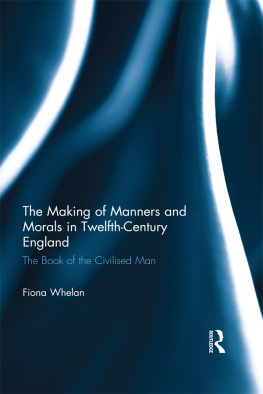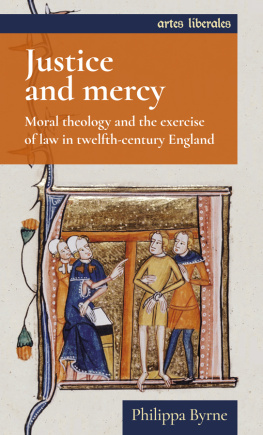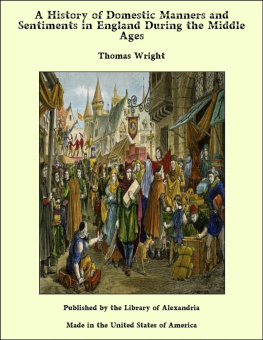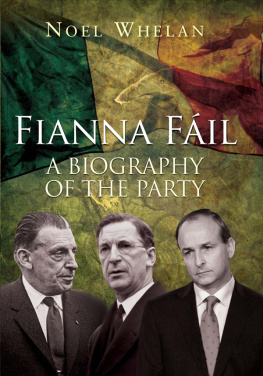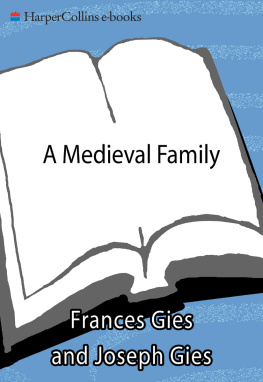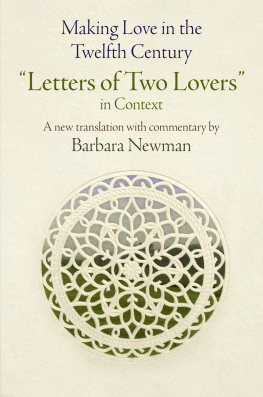Whelan Fiona - The Making of Manners and Morals in Twelfth-Century England
Here you can read online Whelan Fiona - The Making of Manners and Morals in Twelfth-Century England full text of the book (entire story) in english for free. Download pdf and epub, get meaning, cover and reviews about this ebook. year: 2017, publisher: Taylor & Francis Group, genre: Children. Description of the work, (preface) as well as reviews are available. Best literature library LitArk.com created for fans of good reading and offers a wide selection of genres:
Romance novel
Science fiction
Adventure
Detective
Science
History
Home and family
Prose
Art
Politics
Computer
Non-fiction
Religion
Business
Children
Humor
Choose a favorite category and find really read worthwhile books. Enjoy immersion in the world of imagination, feel the emotions of the characters or learn something new for yourself, make an fascinating discovery.
- Book:The Making of Manners and Morals in Twelfth-Century England
- Author:
- Publisher:Taylor & Francis Group
- Genre:
- Year:2017
- Rating:3 / 5
- Favourites:Add to favourites
- Your mark:
- 60
- 1
- 2
- 3
- 4
- 5
The Making of Manners and Morals in Twelfth-Century England: summary, description and annotation
We offer to read an annotation, description, summary or preface (depends on what the author of the book "The Making of Manners and Morals in Twelfth-Century England" wrote himself). If you haven't found the necessary information about the book — write in the comments, we will try to find it.
Whelan Fiona: author's other books
Who wrote The Making of Manners and Morals in Twelfth-Century England? Find out the surname, the name of the author of the book and a list of all author's works by series.
The Making of Manners and Morals in Twelfth-Century England — read online for free the complete book (whole text) full work
Below is the text of the book, divided by pages. System saving the place of the last page read, allows you to conveniently read the book "The Making of Manners and Morals in Twelfth-Century England" online for free, without having to search again every time where you left off. Put a bookmark, and you can go to the page where you finished reading at any time.
Font size:
Interval:
Bookmark:
First published 2017
by Routledge
2 Park Square, Milton Park, Abingdon, Oxon OX14 4RN
and by Routledge
711 Third Avenue, New York, NY 10017
Routledge is an imprint of the Taylor & Francis Group, an informa business
2017 Fiona Whelan
The right of Fiona Whelan to be identified as author of this work has been asserted by her in accordance with sections 77 and 78 of the Copyright, Designs and Patents Act 1988.
All rights reserved. No part of this book may be reprinted or reproduced or utilised in any form or by any electronic, mechanical, or other means, now known or hereafter invented, including photocopying and recording, or in any information storage or retrieval system, without permission in writing from the publishers.
Trademark notice: Product or corporate names may be trademarks or registered trademarks, and are used only for identification and explanation without intent to infringe.
British Library Cataloguing-in-Publication Data
A catalogue record for this book is available from the British Library
Library of Congress Cataloging-in-Publication Data
A catalog record for this book has been requested
ISBN: 978-1-138-69629-7 (hbk)
ISBN: 978-1-315-52489-4 (ebk)
Typeset in Bembo
by Keystroke, Neville Lodge, Tettenhall, Wolverhampton

Manuscripts containing full copies of Urbanus magnus :
- C1 MS 61/155, Gonville and Caius College, Cambridge
- D MS 97, Trinity College, Dublin
- W MS F.147, Worcester Cathedral Library
Manuscripts containing partial copies of Urbanus magnus :
- C2 MS 79, St Johns College, Cambridge
- L1 MS Arundel 52, British Library, London
- L2 MS Cotton Titus A. XX, British Library, London
- L3 MS Royal 10 A. X, British Library, London
- O1 MS Bodley 310, Bodleian Library, Oxford
- O2 MS Rawlinson C.552, Bodleian Library, Oxford
- O3 MS 18, Trinity College, Oxford
- P1 MS Latin 3718, BnF, Paris
- P2 MS Latin 15170, BnF, Paris
The 1939 published edition of the text used the following sigla:
- C MS 61/155, Gonville and Caius College, Cambridge
- D MS 97, Trinity College, Dublin
- W MS F.147, Worcester Cathedral
- T MS Cotton Titus A. XX, British Library, London
As this book discusses eight additional manuscripts, I have slightly amended Smylys sigla and created new ones.
| CBMLC | Corpus of British Medieval Library Catalogues |
| CCCM | Corpus Christianorum continuatio mediaevalis |
| CSEL | Corpus scriptorum ecclesiasticorum Latinorum |
| EEA | English Episcopal Acta |
| EETS | Early English Text Series |
| GRA | Gesta Regum Anglorum |
| MTB | Materials for the History of Thomas Becket |
| PL | Patrologia Latina |
| RSB | The Rule of St Benedict |
| RSS | Regimen sanitatis Salernitatem |
| SPAM | Stans puer ad mensam |
| UM | Urbanus magnus |
I am indebted to my doctoral supervisor Professor Lesley Smith at the University of Oxford for her support and guidance from the initial concept of working on Urbanus magnus to this final culmination. She helped to tease out ideas in discussions and guided me when I was hitting brick walls. Many others have kindly provided useful advice along the way, including Professor Paul Brand at the University of Oxford, whose advice on medieval legal terms was invaluable, and Professor Hugh Thomas at the University of Miami, for pointing me to archival sources for Daniel of Beccles, kindly sending me an advance copy of his book on the secular clergy in England, and providing advice in turning my thesis into a monograph. I am also grateful to the members of the Oxford Medieval Diet Group for allowing me to participate and for helping to steer my research to be more interdisciplinary. The opportunities that have come from participation in this group have been invaluable and I am deeply grateful. I am further indebted to Professor Roger Stalley of Trinity College Dublin for fostering an interest in the medieval period through art and literature, and to Professor David dAvray of University College London for guiding my path into medieval history and the study of manuscripts.
This publication has been made possible by a grant from the Scouloudi Foundation in association with the Institute of Historical Research. In addition, I would like to express my thanks to the British Library, the Master and Fellows of Corpus Christi College, Cambridge, and the City of Bayeux for permission to reproduce their images in this book.
Finally, I would like to thank those who kindly read and assisted in the editing process of both my original doctoral thesis and its revised form, as it appears here. Dr Jed Foland, Brendan Whelan, and Neasa McGarrigle provided wonderful assistance in pulling it together. Finally, I wish to thank my family for their un- wavering support, patience, and understanding throughout this process. I would never have reached this point without them.
Quisquis es in mensa, primo de paupere pensa;
Nam cum pascis eum, pascis, amice, Deum.
Nescit homo plenus, quam vitam ducat egenus.
Nemo cibum capiat, donec benedictio fiat.
Nec capiat sedem, nisi quam vult qui regit edem.
Donec sint possita tibi fercula mandere vita,
Et mundi digiti tibi sunt unguesque polita.
In disco tacta non sit bucella redacta.
Non tangas aures nudis digitis neque nares.
Non mundes dentes ferro acuto ad comedentes.
Sal non tangatur esca quo vase locatur.
Si potes hec repeto in mensa ructare caueto.
Esse scias vetitum in mensa ponere cubitum.
Lege mandatur ne parapsis ad osque ponatur.
Qui vult potare debet prius os vacuare
Et sint illius labia tersa prius;
Nec tacere ossum, ne dentibus laceret ossum.
Non dicas verbum cuiquam quod ei si acerbum.
Ne possit quis irasci vel discordia nasci.
Vultu sis hilaris, nullam tamen irridearis.
Si pauce loqueris, gratior sodalibus eris.
Mensa submota, manus ablue, postea pota.
Privetur mensa, qui spreverit hec documenta.
Whoever eats at the table, at first, think of the poor man;
For when you feed him, you feed, with goodwill, God.
No man should know fullness, any such life should be led in want of.
No one should grasp food, while the blessing takes place.
Nor take a seat, unless he who rules the house is willing.
While plates are set for you, avoid eating,
And your fingers should be clean and nails smooth.
A morsel of food which has been touched should not be put back in the dish.
You should not touch your ears or nose with your fingers.
You should not clean your teeth with a sharp weapon when finished eating.
Nor should salt which has touched meat be placed in that vessel.
If you can, I repeat this, avoid belching at the table.
You should know, to be respected at the table, to go to bed.
With the principle commanded, the dish should not be put up to the mouth.
Anyone who wishes to drink, the mouth should first be empty
And lips should be wiped of [food] first;
Neither touch the bone, nor chew it with teeth.
You should not say a harsh word to anyone
No one should get angry or discord is born.
You should have a cheerful face, however you should not be ridiculed.
Font size:
Interval:
Bookmark:
Similar books «The Making of Manners and Morals in Twelfth-Century England»
Look at similar books to The Making of Manners and Morals in Twelfth-Century England. We have selected literature similar in name and meaning in the hope of providing readers with more options to find new, interesting, not yet read works.
Discussion, reviews of the book The Making of Manners and Morals in Twelfth-Century England and just readers' own opinions. Leave your comments, write what you think about the work, its meaning or the main characters. Specify what exactly you liked and what you didn't like, and why you think so.

